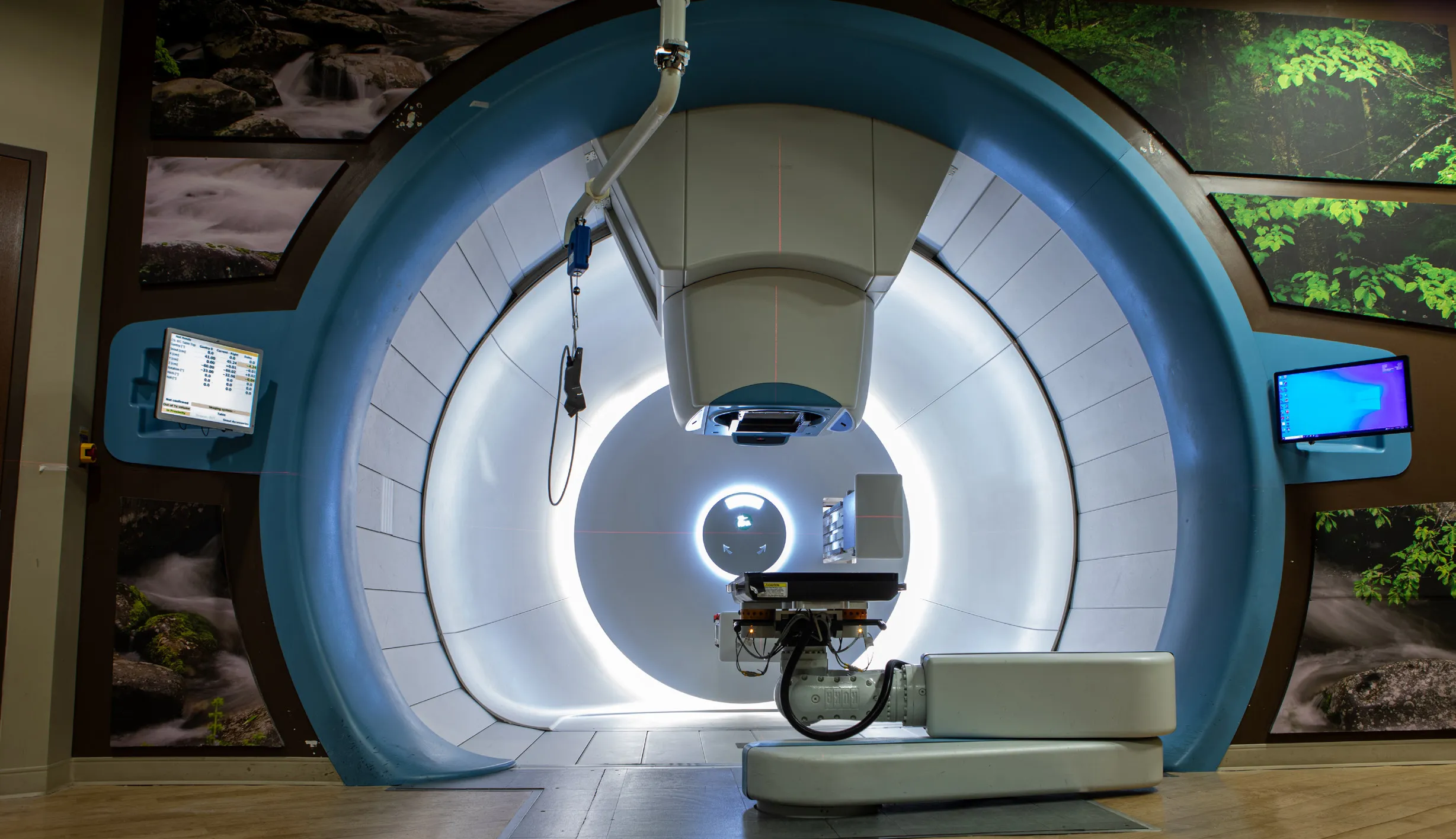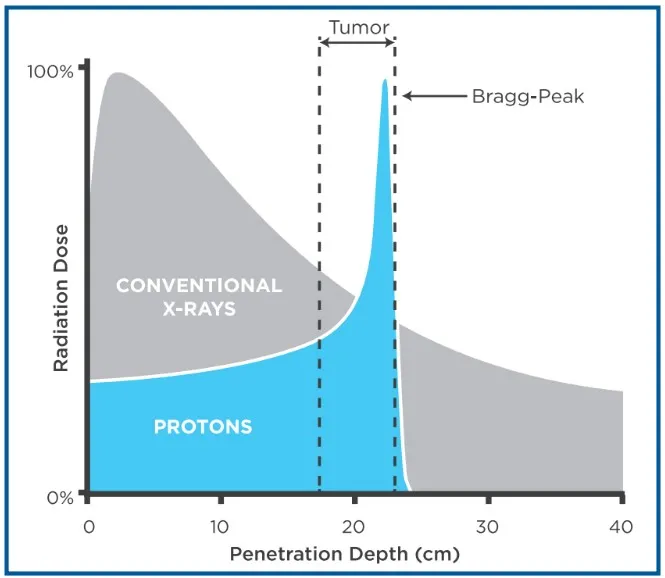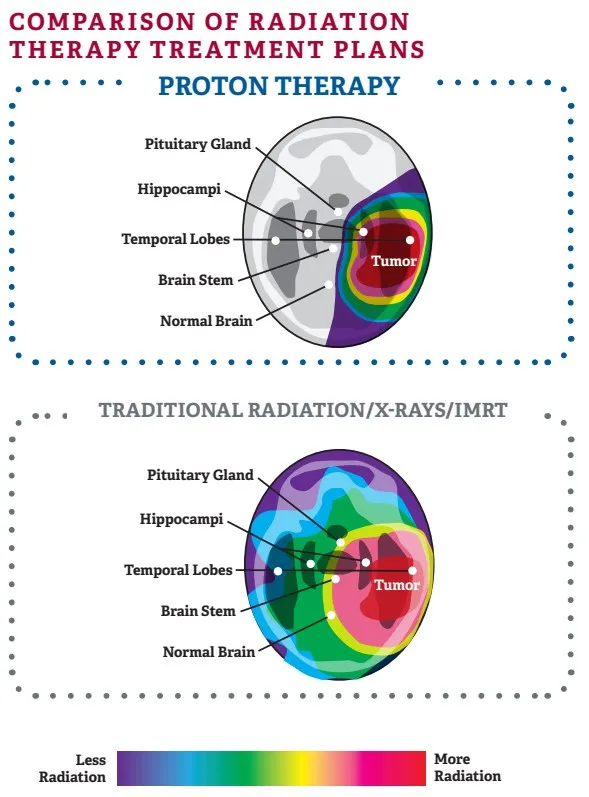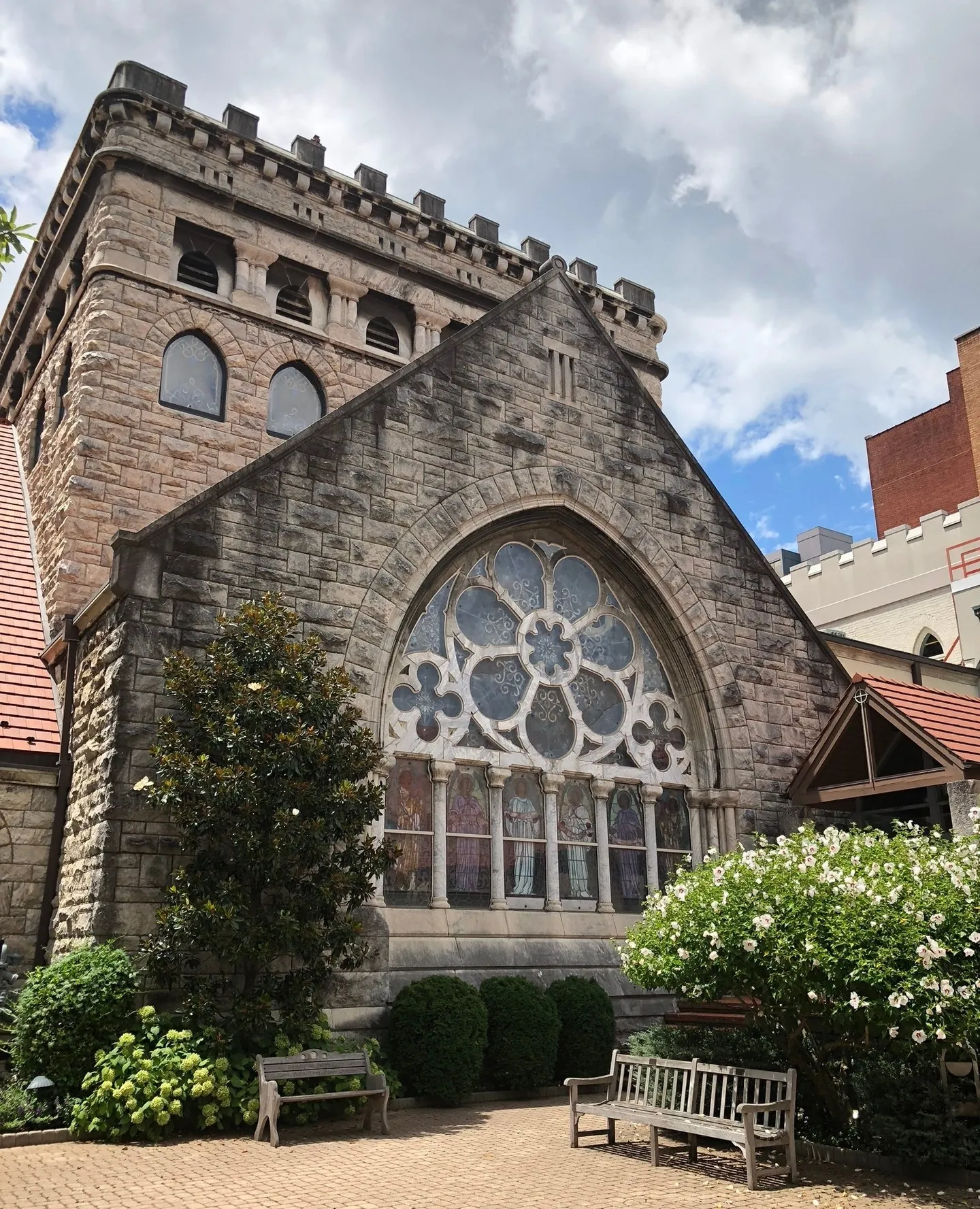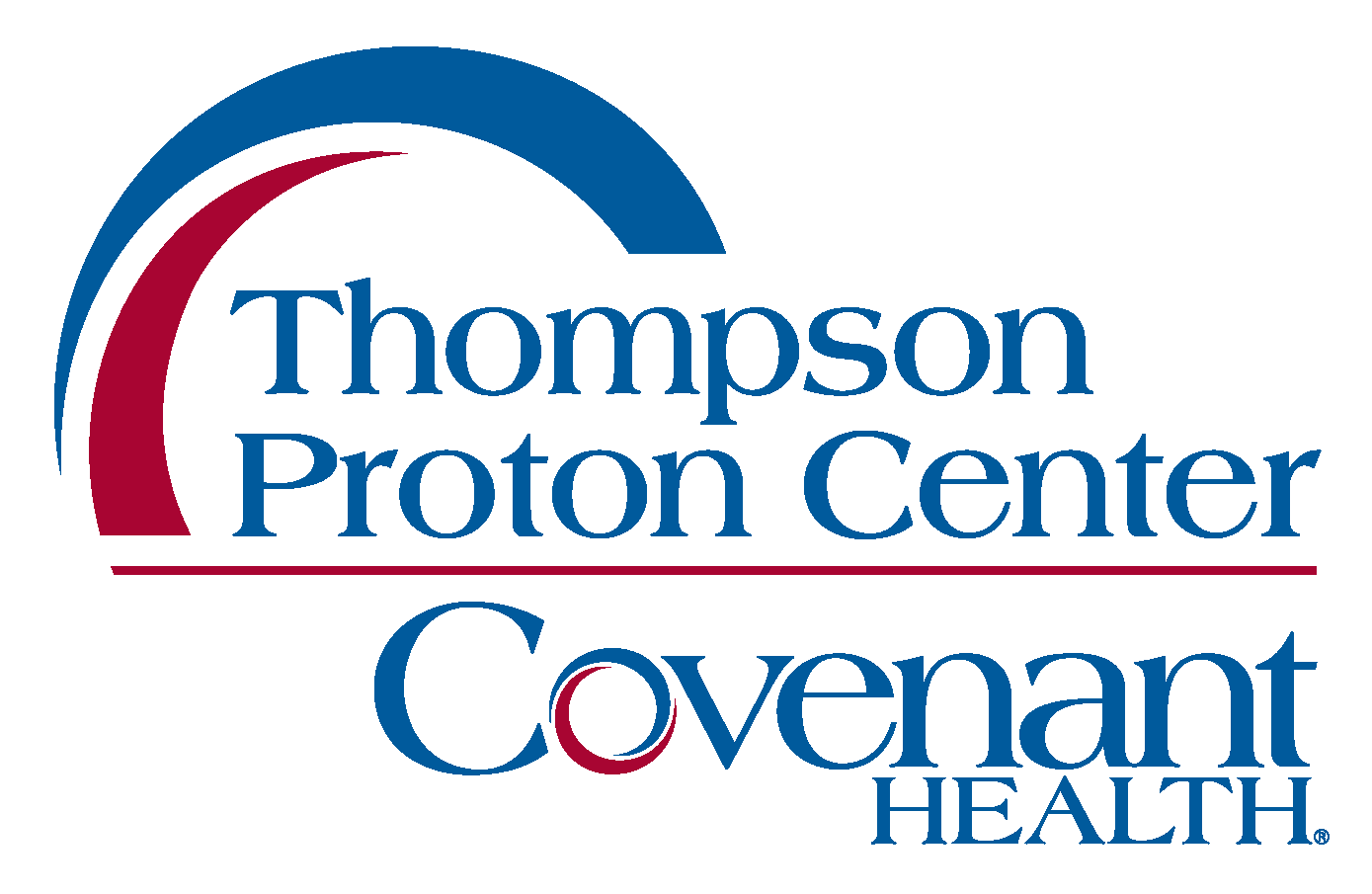Our Comprehensive Guide to
Proton Therapy
Treatment
Built on a not-for-profit mission of community service, Covenant Health and its member organizations are working together to be the first and best choice for a healthier East Tennessee.
Scroll To A Section
Proton Therapy Explained
What Is Proton Therapy?
Proton therapy is an advanced form of radiation therapy that uses a single beam of high-energy protons to treat various forms of cancer. Just as with conventional radiation, protons treat tumors by directing radiation into the tumor site where doses of radiation destroy cancerous cells.
How Proton Therapy Works
Both conventional (x-ray) radiation therapy and proton therapy attack tumors by preventing cancer cells from dividing and growing. When protons enter the body, they deposit most of their energy in the target, destroying cancerous cells and reducing damage to surrounding areas and critical organs. This differs from conventional x-ray radiation, that has higher dose both before and after the tumor.
To further explain, look at the graph to the right (or above if you’re using a phone), and imagine that the Y-axis (the vertical line representing the radiation dose) is the surface of a patient’s skin, moving left to right on the X-axis (the horizontal line) measures the depth of penetration into the patient’s body, and the tumor is located in the area between the dotted lines. The goal of treatment is to deliver the proper dose of radiation directly to the tumor while limiting the amount of radiation exposure to surrounding healthy tissue. The sloping gray area shows how x-rays deliver dose. To deposit the proper amount of energy into the tumor, conventional x-rays must irradiate much of the healthy tissue in front of the targeted tumor and, by their nature, they continue to penetrate and irradiate tissue after the tumor.
The light blue shaded area shows how protons deposit dose in the body. Protons are much larger and heavier than x-rays, so they interact differently. They enter the body at a low dose, moving very quickly (2/3 the speed of light!), and start to slow down as they go deeper into the body. As they start to slow down, they deposit more dose. This causes a rapid rise in dose, called the Bragg Peak, then the protons stop. Based on the energy of the protons, they are designed to deposit most of their dose and stop inside the tumor. Because the protons stop, they don’t deposit any dose after the tumor, sparing healthy tissues better. This allows proton therapy to target the tumor with precise accuracy, potentially delivering higher and more effective doses where needed, and reducing damage to nearby healthy tissue.
How Is It Different From Traditional Radiation Therapy?
Proton therapy is a highly advanced and extremely precise form of radiation. The physical properties of protons, described by the Bragg-Peak (Figure 1 above), and the increased conformality of pencil beam scanning make it possible to spare healthy surrounding organs from unnecessary radiation exposure during treatment.
Why Is This Important?
When treating breast cancer with proton therapy, surrounding tissue and vital organs such as the heart and lungs are exposed to far less radiation than standard therapy. Therefore, people treated with proton therapy experience fewer side effects and an improved quality of life during and after treatment.
Survivor Story
Nick Parker Beat Esophageal Cancer With Proton Therapy From The Thompson Proton Center
Proton Therapy Effectiveness & Benefits
Is Proton Therapy Effective?
Yes! There are many American and international clinical studies that prove the effectiveness of Proton Therapy including the three studies mentioned below on this page. We’re happy to provide even more information, please reach out to us and we’ll be happy to share more.
Can Proton Therapy Be Used In Conjunction With Other Forms Of Cancer Treatment?
Yes! Of course, each case is different and a treatment plan customized to meet the patient’s needs must be implemented but Proton Therapy can be used in conjunction with conventional radiation, chemotherapy, hormone therapy, and/or as a follow-up to surgery.

What Are The Key Benefits Of Proton Therapy?
Proton therapy is substantially more precise than other types of radiation therapy. To ensure proton beams are delivered precisely to your tumor, our radiation oncologists design custom treatment plans that fit the shape and depth of your unique tumor. This allows us to deliver the majority of the proton energy within your tumor while leaving the surrounding healthy tissue intact.
With greater precision and accuracy, proton therapy can offer several benefits, such as:
- Less damage to healthy tissue: With any type of radiation treatment, there are really two main objectives; deliver an effective radiation treatment to your tumor while simultaneously avoid radiation to the surrounding healthy tissue. Proton therapy can reduce the radiation dose to healthy surrounding tissues by 5- to 70 percent. Reduced radiation exposure means less tissue damage which in turn results in lower risk of later complications due to radiation.
- Possibility for higher radiation dose: A higher radiation dose can sometimes be more effective in destroying cancer cells. In the past, that meant dangerous irradiation of healthy surrounding tissues. With proton therapy, we’re able to increase the radiation dose if it makes sense for your unique tumor while leaving health surrounding tissues intact.
- Ability to treat cancer in critical areas: Proton therapy’s precision allows it to be used to treat tumors located nearby to vital organs and other tissues sensitive to radiation.
- Fewer, milder side effects: In recent studies, proton therapy patients have reported fewer occurrences of side effects typically experienced with traditional radiation therapy. Specifically, pain, difficulty swallowing, difficulty breathing, nausea, and diarrhea.
- Potentially higher cure rates: Due to our ability to deliver higher radiation doses with proton therapy, some patients are able to see longer periods of cancer control.
- Ability to treat recurrent cancer: For patients who have received radiation treatment before, they may not be able to receive it again in the event the cancer returns (recurrent cancer). The healthy tissue surrounding a tumor can become irreversibly damaged from too much radiation. That’s not a problem with proton therapy, however, thanks to its ability to deliver proton energy precisely to a tumor.
Why Is Proton Therapy Particularly Effective For Treating Tumors Near Sensitive Organs?
While proton therapy can be used to treat many tumors throughout the body, the benefits of its precision truly are realized when used to treat tumors near sensitive organs such as the brain, eyes, salivary glands, heart, and many more. The precision of proton therapy reduces the likelihood of subsequent side effects such as blindness, hearing deterioration, and dry mouth. Secondary malignancies are also less likely with proton therapy.
Why Does Proton Therapy Offer Fewer Side Effects?
Proton Therapy is an advanced form of radiation therapy that precisely targets the tumor utilizing proton particles. Proton particles stop inside the body and do not deposit radiation beyond the tumor they are targeting, causing less damage to healthy tissue. Proton therapy is effective in treating a broad range of tumors including brain, prostate, head and neck, central nervous system, lung, breast, sarcoma, gastrointestinal and many pediatric cancers.
How Does Proton Therapy Help Maintain Quality Of Life During & After Treatment?
Because proton therapy reduces treatment-related side effects, most patients are able to maintain their levels of pre-treatment activity throughout treatment.
Survivor Story
Pam Vallelian Beat Plasmacytoma With Proton Therapy From The Thompson Proton Center
Clinical Benefits of Proton Therapy
There are numerous benefits thanks the precision offered by Proton Therapy.
Proton therapy delivers significantly less radiation to sensitive organs such as the eyes, spinal cord, brain, and others than X-Rays, greatly reducing the likelihood of side effects.
In addition, patients see reductions in secondary cancer recurrences, greater disease control, longer periods of remission, and most importantly, higher survival rates.

Clinical Benefits for Specific Cancer Types
- 31% relative reduction in occurrence of secondary cancers
after treatment
- 31% increase in disease control for aggressive tumors at base of skull (chordomas) at 5 years
- 50% less likely to have secondary brain tumor from treatment
- 55% reduction in average dose to the hippocampi (memory function) in treatment of meningioma
- 27% reduction in overall risk of needing a feeding tube for
oropharyngeal cancer - Fewer side effects first 3 months after treatment, quicker return to normal function in patients with oropharyngeal cancer
- 45% reduction in overall risk of needing a feeding tube for nasopharyngeal cancer
- Dramatic reduction of negative impact on taste, nausea, and painful changes to the mouth in salivary gland treatment
- 44% relative increase in disease free survival rate for nasal and paranasal sinus cavity cancers at 5 years
- 88% less radiation dose to the heart for left sided breast cancer
- 44% reduction in clinically significant radiation doses to the lung
- 90% of partial breast irradiation cases result in good to excellent
cosmetic outcomes at 5 years - Well tolerated – Less than 4% serious side effects (grade 3) in locally advanced breast cancer
- 35% relative increase in overall survival for Stage II & III lung cancer
- 56% relative reduction in incidences of serious (grade 3) pain with
swallowing (esophagitis) - Up to 4-week reduction in treatment time for select cases
- Associated with excellent local control and favorable survival rates
- Able to treat larger tumors (>6cm) ineligible for stereotactic
radiation (SBRT) or ablation
- 10% increase in overall survival at 5 years in stage I-III disease
- 10% increase in local cancer control at 5 years in stage II-III
- 15% decrease in distant metastasis at 5 years in stage II-III
- 26% reduction in pulmonary toxicity compared with X-ray
therapy (IMRT) - 21% reduction in the risk of severe, treatment related
lymphopenia, particularly in lower esophagus - 3-4-day reduction in average hospital stay after surgery
- 5% higher 5-year overall survival in intermediate risk
- Patients who received proton therapy report highest quality of life compared to surgery, x-ray, or brachytherapy patients
- 35% less radiation to the bladder and 59% less radiation to the
rectum - 42% reduction in relative risk of developing a secondary
malignancy - 50% reduction in treatment related bowel frequency and
urgency at 2 years - 21% lower risk of urinary toxicity at 2 years
- 25% lower risk of erectile dysfunction at 2 years
- More than 50% reduction in radiation dose to critical structures including bone marrow
WORLD CLASS ONCOLOGY CARE
Of Patients Believe They Made The Best Treatment Choice.
An Overwhelming Majority Of Proton Therapy Patients Feel They Made The Right Choice.
Thompson Proton Center and Covenant Health are pioneering oncology care.
Cancers Treatable With Proton Therapy
Proton therapy is an advanced form of radiation therapy that uses a single beam of high-energy protons to treat various forms of cancer. Just as with conventional radiation, protons treat tumors by directing radiation into the tumor site where doses of radiation destroy cancerous cells.
Prostate Cancers
All Risk Categories
Breast Cancer
Early Stage: Whole & Partial Breast
Advanced Stage / LN Positive
Lung and Thoracic Cancers
Lung Carcinoma
Non-Small Cell
• Small Cell (Localized)
• Lymphoma
Thymoma
Head & Neck Cancers
Nasopharyngeal Carcinoma
Paranasal Sinus
Major Salivary Glands
• Parotid
• Submandibular
• Sublingual
Adenoid-Cystic Carcinomas
Oral Cancers
Base of Tongue
Tonsil
Hypopharynx
Gastrointestinal (GI) Cancers
Esophageal
Liver
Pancreatic
Rectal
Anal
Gynecological Cancers
Endometrial / Uterus
Cervix
Lymphoma
B-Cell
Hodgkin
Brain and Skull Base Tumors
Glioma
Meningioma
Astrocytoma
Chordoma / Chondrosarcoma
Acoustic Neuroma
Ependymoma
Hemangioma
Pituitary Adenoma
Benign Lesions
• Arteriovenous Malformations
• Juvenile Angiofibroma
Bladder Cancer
Pediatric Cancers
Sarcomas of Bone or Soft Tissue
Ewing’s Sarcoma
Osteosarcoma
Muscle and Connective Tissue
Chondrogenic Sarcoma
Benign Tumors
Orbital & Eye Tumors
• Lacrimal Gland Tumors
• Orbital Tumors
Tumors Needing Re-Irradiation
Previously treated tumors requiring
additional irradiation
Recurrent or progressive cancers
WORLD CLASS ONCOLOGY CARE
Of Patients Recommend Proton Therapy
An Overwhelming Majority Of Proton Therapy Patients Recommend It To Others.
Thompson Proton Center and Covenant Health are pioneering oncology care.
What To Expect With Treatment

What Is The Treatment Timeline From Start To Finish?
This timeline varies greatly depending on the individual’s diagnosis and individual treatment plan. Every patient starts the journey to treatment with a consultation which is the initial meeting with a radiation oncologist and other team members. The radiation oncologist will review your case and discuss with you options and goals for treatment. Most patients can be scheduled for a consultation the same week they call.
The time it takes to work through the pre-treatment steps of the process ranges from days in urgent cases to several weeks if other tests, scans, or coordination of care with other parts of a treatment plan is needed. Once a patient starts active treatment, they come daily, usually M-F, for one week in some cases, up to seven or eight weeks in others.
Do I Have To Fly To Knoxville For The Initial Consultation? If So, How Many Times And For How Long?
Yes, our physicians need to do a thorough examination, medical records review, and discuss options with potential patients. Our initial consultations appointments are extensive and give patients the opportunity to discuss and review their case with one of our board certified radiation oncologists as well as other members of the team who can be great resources, such as our finance team, our hospitality coordinators who can help talk through lodging and resources during treatment, or our clinical trials team if appropriate. If you have concerns about flying in for your consultation, please share that with our Care Coordinators, they can talk about options to do a preliminary case review and ways to make the most out of your initial trip by tentatively scheduling your pretreatment appointments while you are in town.
Do We Work With Your Pre-Existing Oncology Treatment (If You Have One)?
Proton therapy can be combined with other cancer treatments in the same way any form of x-ray radiation can. Our team gathers records and carefully coordinates timing and planning with your existing oncology teams, such as your surgeons, medical oncologists, or urologists. If you do not yet have an oncology team, our doctors and team will be happy to refer you to other specialists and coordinate your care to get you started as quickly as possible.
How Long Do I Have To Wait To Start Treatment?
This depends on your diagnosis and individual urgency. Once it is decided that proton therapy is the best treatment option, patients complete a CT Simulation for treatment planning. After the CT Simulation, time to treatment start is generally 1 to 3 weeks to get the proton therapy treatment delivery plan created and schedule your first treatment.
How Long Is Treatment?
When patients begin their proton therapy, most treatments are 30 minutes to 1 hour of scheduled time each day, M-F. Most of this time is preparing and positioning with the actual proton beam on only a couple of minutes.
What Will My Life Be Like During Treatment? How Active Can I Be? How Will I Feel?
This is very cancer diagnosis and patient specific. Most patients receiving proton therapy are able to maintain their pre-treatment activities or work throughout their treatment course. If a patient leads an active lifestyle before treatment, they will likely be able to continue during treatment. It is important to speak to your radiation oncologist about limitations during treatment and patients.
What Is Recovery Like During The 3-6 months Following Treatment?
Regular follow up appointments with your radiation oncologist and clinical team to monitor your recovery will be scheduled at your last treatment. Recovery is individual and depends. Your radiation oncologist will let the team know when to schedule your first follow up appointment. However, you will have your team’s contact information and know who to call should you have any questions or concerns or need to talk with your physician before your appointment.
Where Do I Stay During Treatment? Do I Have To Stay In Knoxville?
It is not necessary to stay in Knoxville, but it is recommend the patient stays within a driving distance for daily treatment. Because proton therapy is a regional resource, 40% of patients travel from out of town (31 states & 11 countries). Many people find it more convenient to stay in the Knoxville area as they go through treatment and take the opportunity to explore the area.
Can You Help Me Find Lodging?
Yes! We have an excellent team of coordinators who will talk with you to learn about your specific preferences and needs. For example, Do you plan to bring a pet for the duration of your stay? Would you prefer lodging without stairs? Are specific kitchen appliances important? Do you need accessible bathrooms and parking? Perhaps, you want to make sure there is a gym, pickle ball courts, walking paths, or a golf course close. We have cultivated relationships with many housing providers from hotels to independent short term rentals or campsites with the best view of the lake or mountains.
Do I Need To Change My Diet?
There are no general modifications to share. One of our team members is an oncology nutrition specialist and can advise you if you have interest. If there is a specific modification that is relevant to your specific diagnosis and treatment area, your physician will discuss this with you.
Do I Need A Referral From My Doctor?
We do accept referrals from physicians, but we also accept self-referred patients. Many patients want to explore all of their options and take advantage of the opportunity to consult with a board certified radiation oncologist who is an expert in proton therapy. Call our care coordinators and they can get the information needed to schedule you for an appointment.
Do I Need To Quit My Job?
Our team will do our best to work with your schedule and they will ask for your treatment schedule preferences. However, patients must be available for daily M-F treatments and have some flexibility in their requests. You need to listen to your body while you are going through treatment, but most patients are able to maintain their pre-treatment activity levels.
Does The Thompson Proton Center Offer Clinical Trials? If So, What Are The Benefits?
Thompson Proton Center participates in multiple clinical trials ranging from clinical registries to randomized, prospective trials. Members of the Thompson Cancer / Covenant Health clinical trials team are present at the center and meet with patients to discuss participation opportunities and to answer your questions.
Does Proton Therapy Entail The Same Number Of Treatments As Conventional Radiation?
In most cases, yes, the number of treatment fractions remains the same. However, the number of treatments (fractions) is dependent on the radiation dose prescription prescribed by your radiation oncologist as part of your treatment plan, based on recommended guidelines, data, disease site, pathology, etc. (multiple factors).
What Sort Of Side Effects Should I Expect?
Your physician and team will review all potential treatment related side effects as they discuss your treatment plan. Most patients are able to continue their pretreatment quality of life and activity levels.
My Child Is Diagnosed With Cancer. Is Proton Therapy An Option?
Proton therapy is the preferred option for many childhood cancers. Please, call our Pediatric Care Coordinator at 865-331-8175 who will connect you with our Pediatric Specialists.
WORLD CLASS ONCOLOGY CARE
Years Of Leading Cancer Care
Since 1985, The Thompson Cancer Survival Center Has Been Pioneering The State Of Cancer Care.
Thompson Proton Center and Covenant Health are pioneering oncology care.
Why Choose The Thompson Proton Center
The Thompson Cancer Survival Center Story

Thompson Cancer Survival Center (TCSC) was founded to bring world-class cancer care to East Tennessee. At Thompson, leading cancer specialists use the most advanced technologies to achieve breakthrough successes in treating many types of cancer. Our doctors have the support of a complete team: Dieticians, genetics counselors, physicists, pharmacists, therapists, technologists, oncology nurses, social workers and others are all there to treat – and beat – the disease.
Therapies pioneered at Thompson have transformed and saved the lives of hundreds of East Tennessee cancer patients, while progressive clinical trials have brought the most advanced new cancer medicines to this area. In addition to the original downtown location, there are TCSC facilities in West Knoxville, Oak Ridge, Sevierville, and Morristown.
As the leader in comprehensive cancer care in East Tennessee, Thompson Cancer Survival Center’s innovations include:
- A Comprehensive Breast Center designated as a Breast Imaging Center of Excellence by the American College of Radiology (ACR). The center is accredited in digital mammography, stereotactic breast biopsy, breast ultrasound, and ultrasound-guided breast biopsy.
- Multidisciplinary Breast and Chest Cancer Clinics offer patients the option of a personal consultation with a team of specialists in a single office visit. These clinics enable physicians to develop an individualized treatment plan that provides seamless care from initial diagnosis through follow-up.
- A Team of Radiation Oncology Physicists dedicated to developing specialized treatment plans for patients. TCSC is the world’s first designated training site for respiratory gating, the most advanced treatment for lung cancer. Thompson is also the only facility in the region to offer TomoTherapy, a radiation treatment that uses digital technology to deliver a precise beam of intensity-modulated radiation therapy.
- Medical Oncology/Chemotherapy – Thompson Oncology Group (TOG) provides the most advanced medical oncology treatment available. TOG physicians have offices in Knox, Anderson, Roane, Blount, Loudon, Sevier, and Hamblen counties.
- Center of Excellence for Treatment of Barrett’s Esophagus – The Fort Sanders Regional Laser Center located at TCSC is world-renowned for pioneering photodynamic therapy for the treatment of Barrett’s Esophagus. It hosts training programs for physicians from some of the nation’s most prestigious cancer centers.
- Cancer Outreach Services provides thousands of free or low-cost mammograms, cervical cancer screenings, prostate cancer screenings and cancer education services to medically under-served groups in Knox and 18 other counties throughout East Tennessee.
- PET Imaging Centers – TCSC’s West, Sevier and Downtown PET Imaging Centers are accredited in positron emission tomography by the American College of Radiology (ACR). This accreditation assures patients that their treatment meets the most rigid standards of excellence mandated by the ACR.
- Clinical Trials – The progressive Clinical Trials program at TCSC has registered nurses certified in clinical trials and oncology who work with physicians to identify patients who may benefit from clinical trials. These specialists counsel patients regarding treatment plans and oversee the follow-up of their care. For more information about Thompson Cancer Survival Center, call 865-331-1678.
WORLD CLASS ONCOLOGY CARE
You're in good hands with The Thompson Proton Center
“The doctors at the seminar were amazing. They told me not to worry, and they would take care of this.” “Everyone was so friendly and welcoming. I appreciated that, because I was at a low point.”
Thompson Proton Center and Covenant Health are pioneering oncology care.
Your Stay In Knoxville, Tennessee
Given that Proton Therapy treatment is typically administered daily Monday through Friday for approximately 4 weeks, you will need to stay in the Knoxville, Tennessee area during the course of your treatment.
The abundant natural beauty is a perfect place for both patients and caregivers to rest and recover.
As soon as you arrive, you're going to see why every resident is proud to call Knoxville home. There's a reason why CNN Travel named it One of the Best Cities in America to Visit.
The abundant natural beauty is a perfect place for both patients and caregivers to rest and recover. While the live music, terrific food scene, and frequent local events will make you feel
Courtesy of Visit Knoxville
So Much To Do, See, Eat, Drink, Listen, and Explore
Nashville and Memphis might be the first two cities that come to mind when thinking of Tennessee but Knoxville is a hidden gem with arguably even more to do than its sibling cities.
Our friends at VisitKnoxville.com have a fantastic website which showcases the restaurants, bars, museums, outdoor activities, monuments, music venues, farmer’s markets, and hundreds of other wonderful activities that Knoxville offers.
Courtesy of Visit Knoxville
Nature At Your Door Step That's Second-To-None
One of the main reasons many people visit (or even move) to Knoxville from other places is so that they can take advantage of the breathtaking outdoors that East Tennessee offers. Living in Knoxville means access to 4,500 acres of green and open spaces and a short drive to many state and national parks.
- World-renowned Mountains (Great Smoky Mountains National Park)
- Hiking trails and greenways – Walkers, runners, hikers, bikers, strollers, and others looking for an outdoor excursion will find the perfect path on one of Knoxville’s scenic paved greenways. Knoxville boasts more than 112 miles of greenways and soft surface trails, with about 54 miles of paved ADA-accessible greenways. Through parks, neighborhoods, and community centers, the greenway system provides recreational routes for runners, walkers, bikers, and adventurers of all kinds.
- Parks & Gardens – Knoxville’s 4,500 acres of green and open spaces provide peaceful retreats and exciting recreation centers.
- Cumberland Gap National Historic Park
- Water – Tennessee River and many lakes with accessible walking and parks
- Boating
- Paddleboarding, Kayaking, other water spots and activites, etc.
The 9 Lakes region is made up of the 16 counties surrounding Knoxville, TN. It stretches from the Cumberland Mountains of Big South Fork National River and Recreation area to the Great Smoky Mountains National Park. The region boasts…
- 4 National Parks, 2 National Scenic Byways
- 2 National Foot Trails, 1 National Scenic River
- 1 National Forest
- 9 TVA Lakes
In every corner of the region, you can find a beautiful place to rest, relax and explore while you’re visiting East Tennessee.
Courtesy of Visit Knoxville
The Great Smoky Mountains National Park
The Great Smoky Mountains National Park is the nation’s most visited national park. While not directly within Knoxville’s borders, it’s just 75 miles from Knoxville.
Courtesy of Visit Knoxville
A Music & Dining Scene That Rivals Nashville
Nashville and Memphis might be the first two cities that come to mind when thinking of Tennessee but Knoxville is a hidden gem with arguably even more to do as its sibling cities.
Courtesy of Visit Knoxville
A Rich Culture To Experience & History To Explore
- Knoxville Museum of Art, featuring the world’s largest glass art installation known as the cycle of life. It also showcases southern Appalachian culture.
- Meant for visitors of all ages, The East Tennessee History Center features history dating back 3 centuries with history current up to the current day.
- Ijams Nature Center, 300 acres originally developed as a bird sanctuary.
- Fort Loudoun State Park (Fort Loudoun State Historic Park is 1,200-acres and is one of the earliest British fortifications on the western frontier, built in 1756. The fort was reconstructed during the Great Depression and was designated a National Historic Landmark in 1965.)
- World’s Fair Park, used to host the World’s Fair in 1982, renovations have transformed it into a beautiful urban mixed use park and commercial district.
- Home to over 900 different species, Zoo Knoxville has received awards for it’s work in preserving Red Pandas.
- Open in 1928, The Tennessee Theater is in the national register of historic places.
- Located on the campus of University of Tennessee, The McClung Museum of Natural History and Culture showcases archaeological finds from Tennessee and around the world.
- Blount Mansion (Blount Mansion is Knoxville, Tennessee’s only National Historic Landmark and the city’s oldest operating museum, opening in 1926.)
- The Museum of Appalachia is a living history museum — a pioneer mountain farm-village that lends voice to the people of Southern Appalachia through the artifacts and stories they left behind.
- The Manhattan Project at Oak Ridge is a Manhattan Project National Historical Park
- East TN Historical Society (Free lecture series offered)
- Great Smoky Mountain Heritage Center
- Sequoyah Birthplace Museum
- K-25 History Center
- New Hope Visitor Center at Y-12
- Every weekend, local vendors sell fresh produce and other wares at the Market Square Farmer’s Market.
- Old City is a historical portion of downtown Knoxville full of points of interest.
- Home of the world’s largest basketball, The Women’s Basketball Hall of Fame, celebrates women in the sport and promotes its future.
- The Mabry-Hazen House Museum was once the home of an incredibly famous and memorable local family.
- The Knoxville Children’s Theater offers fun, exciting performances for children, by children and introduces them to the world of the performing arts.
- Muse Knoxville offers 4,000 square feet of STEM-focused activities and education for kids.
Courtesy of Visit Knoxville
Knoxville Awards & Recognitions
- Knoxville named one of the Best BBQ Cities in America. Source: LawnStarter.com, July 2024.
- Knoxville named one of Best Places to Rent in America. Source: WalletHub.com, July 2024.
- Knoxville named one of the Most Educated Cities in America. Source: WalletHub.com, July 2024.
- Knoxville named as one of the Best Run Cities in America. Source: WalletHub.com, June 2024.
- Knoxville named one of America’s Best Towns to Visit. Source: CNN.com/Travel, June 2024.
- Knoxville ranked 8th in list of Cities with the Highest Number of Most Move-ins. Source: PODS.com, June 2024.
- Knoxville named among 150 Best Places to Live in America. Source: RealEstate.USNews.com, June 2024.
- Knoxville named as one of the Best Cities for First-Time Homebuyers. Source: ConsumerAffairs.com, June 2024.
- Knoxville named one of Top 10 Best Places to Start a Career. Source: WalletHub.com, May 2024.
- Knoxville named as one of the Top 25 Places to Live in the U.S. Source: Kiplinger.com, May 2024.
- Knoxville named as one of the Best Places to Raise a Family. Source: WalletHub.com, May 2024.
- Knoxville named among Top 100 Best Places to Live in the U.S. Source: Livability.com, May 2024.
- Knoxville named as one of the Healthiest Places to Live in the U.S. Source: WalletHub.com, April 2024.
- Knoxville named #2 in 10 Best Arts Districts in the U.S. for a Creative Escape. Source: USAToday.com, March 2024.
- Knoxville named one of Most Culturally Diverse Cities in the U.S. Source: WalletHub.com, February 2024.
- Knoxville named as one of the Happiest Cities in America. Source: WalletHub.com, February 2024.
- Knoxville named as one of the Best Places to Retire. Source: RealEstate.USNews.com, February 2024.
- Knoxville named one of Best Football Cities for Fans. Source: WalletHub.com, February 2024.
- Knoxville named in 25 Cheapest Places to Live. Source: Kiplinger.com, February 2024.
- University of Tennessee ranked Among America’s Best Large Employers. Source: Forbes.com, February 2024.
- Knoxville named as one of the Best Cities for Jobs. Source: WalletHub.com, January 2024.
- Knoxville named One of MovieMaker’s Best Small Cities and Towns to Live and Work as a MovieMaker. Source: MovieMaker, January 2024.
- Fill in our quick form
- A care coordinator will contact you by phone during normal business hours.
- We’ll take the time to listen and plan the next steps
Call us now at 865.770.7401
or reach out using the form below.
A care coordinator will contact you by phone during normal business hours.

